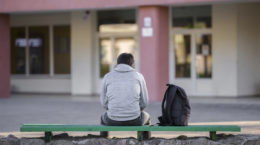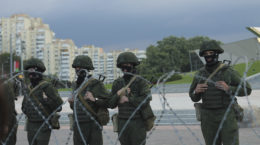In Belarus, there has been a significant increase in the number of so-called “military-patriotic clubs” operating under the auspices of the country’s security forces. These clubs engage in purposeful militarization and ideological indoctrination of youth.
In recent years, Belarus has witnessed a notable increase in the establishment of what are commonly referred to as “military-patriotic clubs” for children and adolescents. These clubs are almost always assigned to specific military units – usually of the Armed Forces, the Interior Ministry or the State Border Committee. In such clubs, children and adolescents are dressed in military uniforms and are instructed in performing military commands, handling weapons, hand-to-hand combat, the fundamentals of collective combat, and more. Children reside in barracks, adhere to a military daily routine, and undergo intensive ideological indoctrination.
In essence, a substantial portion of children’s time is spent preparing to become future professional soldiers, rather than receiving regular school education and pursuing civilian professions. Year by year, Belarusian security forces are increasing the number of youths recruited into such clubs (now encompassing many thousands of boys and girls) and openly express their intentions to subject all Belarusian teenagers, without exception, to ‘military-patriotic education’ (in reality – militarization).
In December 2022, Sergey Kornev, the Head of the Department for Moral and Psychological Support within the Main Directorate for Ideological Work at the Belarusian Defense Ministry, announced that dozens of military-patriotic clubs and classes, supervised by the Ministry of Defense, including those within military units, had already been established in Belarus.
“As of today, there are more than fifty of these clubs operating in Belarus,” Kornev stated. “Furthermore, educational institutions feature specialized military-patriotic classes, with over 80 of them at the beginning of the academic year. Military-patriotic education is also conducted in pre-conscription training centers, with over 50 established throughout the country. Children can receive relevant education at the Minsk Suvorov Military School and cadet schools in each region, where military personnel also engage in educational activities”.
Furthermore, the Ministry of Internal Affairs (MIA) is actively involved in setting up military-patriotic clubs, many of which have been established at the Internal Troops units. By the end of 2022, these clubs had already enrolled approximately two thousand children, as reported by the head of the MIABesides, the Ministry of Emergency Situations (MES) has embarked on similar work.
In addition, there are 755 interest-based associations of a military-patriotic nature operating within general educational institutions, involving 10,970 children and adolescents. Moreover, in extracurricular educational institutions for children and youth, there are 213 such military-patriotic associations with 3,579 participants. Furthermore, for the past 20 years, the Ministry of Defense, in collaboration with the Ministry of Education, has been organizing children’s military-patriotic camps and gatherings. Since 2022, they have also resumed conducting the military-sports game “Orlenok” at the base of the 120th Mechanized Brigade.
Minsk Military Unit No. 3214, a special forces division of the Belarusian Internal Troops under the Ministry of Internal Affairs, has become a sort of leader in the field of “military-patriotic upbringing” for schoolchildren in Belarus. It is precisely on its base the well-publicized military-patriotic club ‘Lynx’, promoted by the Belarusian state mass media, operates.
On September 1st, the Knowledge Day, when all regular schoolchildren returned to their first classes after the holidays, a solemn gathering was held at Military Unit No. 3214 in Minsk for the brigade’s personnel. The event was attended by the leadership of the Internal Troops, mercenaries-instructors from the Wagner Private Military Company (PMC), veterans, members of military-patriotic clubs, and invited guests from other security forces.
On the 81st anniversary of the Special Forces Brigade, those in attendance were congratulated by the Deputy Minister of Internal Affairs and Commander of the Internal Troops, Major General Nikolai Karpenkov, who didn’t hesitate to boast: “Considering the heated situation of the past year, we have made significant changes to our operations and substantially reshaped our organizational-personnel structure. Military Unit 3214 has become the most powerful and numerous within the Internal Troops. …In just one year, the military unit has transformed into a special forces contingent within the Internal Troops, totaling nearly 2,000 personnel. These extensive structural changes have opened up new possibilities for enhancing combat and specialized training. Currently, intensive training sessions are being conducted at our training center in collaboration with instructors from the “Wagner” Private Military Company.”
Major General Nikolai Karpenkov also addressed the “Wagner” Private Military Company (PMC) instructors separately and expressed special gratitude to them for sharing their combat experience. The Commander of the Internal Troops also praised the brigade’s leadership for their efforts in military-patriotic education of youth, stating, “You have become a flagship and driving force in the development of this direction and have set an excellent example for all of our units and military divisions. Understanding the importance of fighting for the future, which is our children, you go above and beyond your official duties and dedicate a significant amount of time to working with adolescents.”
In fact, the ceremonial part of the event concluded with a festive concert, which also featured exhibition performances in hand-to-hand combat by those very teenagers who are members of the military-patriotic club ‘Lynx’.
It turns out that schoolchildren and teenagers are being accustomed to military life and trained in military specialties not by military educators (who have an understanding of the pedagogical process and how children’s psychology works) but by Belarusian special forces stormtroopers and mercenaries from the “Wagner” Private Military Company (PMC). The last ones have gained notoriety for their brutal crimes against civilians in Africa, Syria, and Ukraine. It’s worth noting that many countries have officially recognized Wagner mercenaries as criminals. For example, the United States classified the PMC “Wagner” as a criminal organization back in January of this year. Yet in Belarus, these individuals have been hired to pass on their experience to Belarusian adolescents.
Reference by “Our House“:
Military Unit No. 3214, also known as the 3rd Separate Red Banner Special Purpose Brigade, is an integral part of the Ministry of Internal Affairs’ (MIA) Internal Troops, stationed in the Uruchye district of Minsk. The unit is under the command of Colonel Dmitry Miksha. In the late 1990s, Miksha led a special purpose reconnaissance platoon within the same unit. It is known (authorities do not particularly conceal this fact) that Miksha’s platoon was involved in ‘search and elimination’ operations against the ‘Russian National Unity’, ‘White Legion’, and ‘Belarusian Freedom Party’.
Soldiers of the special brigade receive specialized training in dispersing mass events. A demonstration of such a dispersal and other crowd control tactics were showcased to Alexander Lukashenko during his visit to the military unit in July 2020 As a sign of protest against the violence by law enforcement in 2020, some former members of the unit defiantly threw away their uniforms.
Our House










